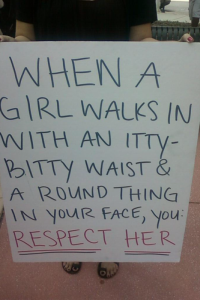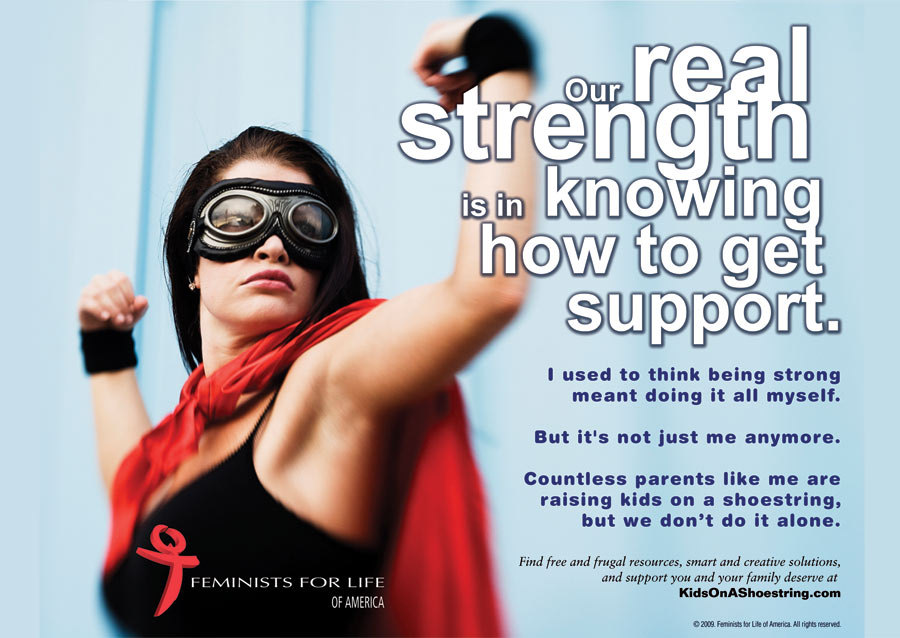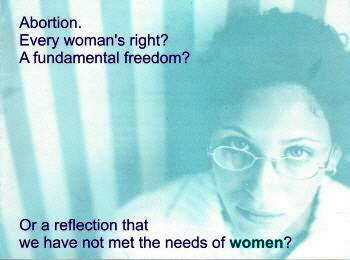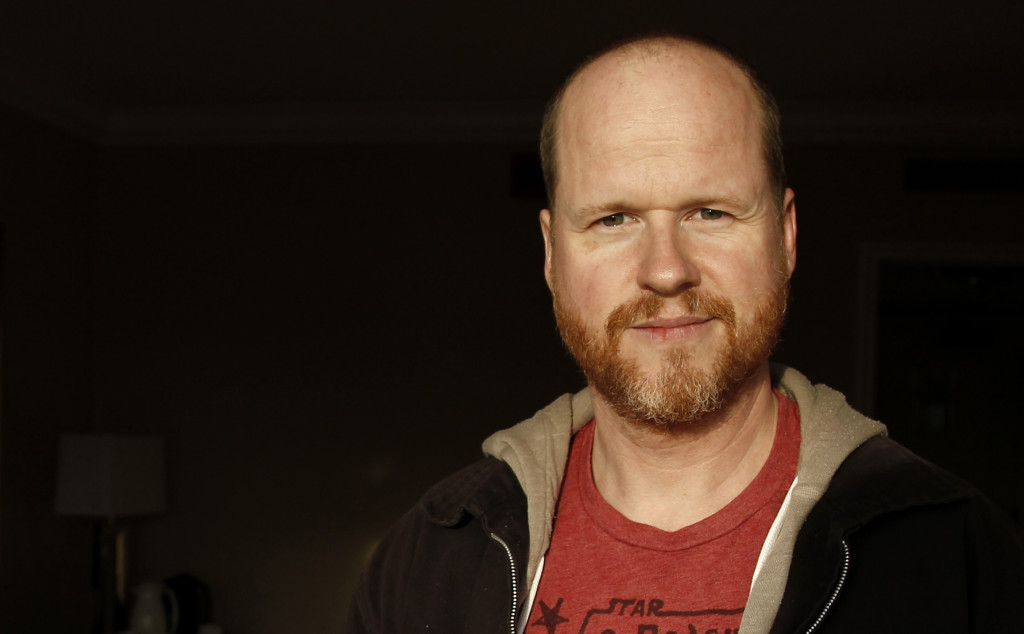I have something in common with Joss Whedon. He doesn’t like the term “feminist,” and neither do I. We both think that feminism has an image problem. Whedon, who defines feminism as “believing men and women to be equal; believing all people to be people” doesn’t like the term because he thinks the “-ist” at the end fails to convey it’s universal appeal.
Let’s be real, Mr. Whedon. The last syllable of the word is the least of feminism’s problems.
I like Joss Whedon’s ostensible definition just fine. The problem is that he, like most self-declared feminists, doesn’t actually stick to it. Feminism is always introduced as something universal and apolitical like “concern for women’s issues,” but then in practice it always ends up being equated with left wing social politics. Do you care about women? Then you must be a Democrat. The Republicans have declared a War on Women, don’t you know?
Because the term “feminism” has become hopelessly entangled in partisan politics, it’s time to step back and differentiate between being concerned for women and feminism. We can find some common ground if we do that, and I can’t think of a better place to start then this famous clip from Patrick Stewart about the importance of opposing violence against women.
It’s a beautiful and moving speech. There’s nothing political about it, and there shouldn’t be. Violence against women is not a political issue. Opposition to violence against women runs deep on both the right and the left. Consider a song like Yellow Belly from Thrice.
You were built for blessing but you only make them bleed, but you don’t care, you don’t care.
And bruises are but shadows of the blackness that you breathe but you don’t care, you don’t care.
The light that’s left inside their eyes is darkened day by day but you don’t care, you don’t care.
The presence pulls the color from the world til all is grey
but you don’t care, you don’t, you don’t, you don’t.
The lyrics are forceful and emotional, ending with the final lines “What mercy have they known from you / to ask that it be shown to you?” They were written by lead singer Dustin Kensrue who, shortly after Thrice disbanded, went on to become a worship leader for the controversial and arch-conservative Mars Hill Church.
 He’s just one example of the fact that social conservatives can and do care about women’s issues passionately. What’s more: this care and compassion doesn’t happen in spite of their conservative beliefs, but because of them. Mars Hill Church advocates traditional gender roles and the idea of “sacrificial leadership” of men over their families, and Yellow Belly explicitly talks about the idea of men “built for blessing.” Fighting against domestic violence is a natural extension of their socially conservative world-view, just as it can also be a natural extension of social liberalism. Sometimes you can start from very different places and still find room for agreement and cooperation.
He’s just one example of the fact that social conservatives can and do care about women’s issues passionately. What’s more: this care and compassion doesn’t happen in spite of their conservative beliefs, but because of them. Mars Hill Church advocates traditional gender roles and the idea of “sacrificial leadership” of men over their families, and Yellow Belly explicitly talks about the idea of men “built for blessing.” Fighting against domestic violence is a natural extension of their socially conservative world-view, just as it can also be a natural extension of social liberalism. Sometimes you can start from very different places and still find room for agreement and cooperation.
Not all the time, of course. The abortion issue is one where conservative and social liberals have very little to agree on. Even in this case, however, any fair-minded and neutral assessment has to concede that pro-life opposition to abortion can also be an expression of pro-women sentiment. Groups like Feminists for Life view abortion as a form of exploitation that perpetuates sexual objectification and infantilization of women, and they cite as precedent early 19th century feminists like Elizabeth Cady Stanton who said “When we consider that women are treated as property it is degrading to women that we should treat our children as property to be disposed of as we see fit.”
The point here isn’t that Feminists for Life are correct (although I do agree with them). The point is that–right or wrong–they are sincerely fighting for women as they understand it. They don’t oppose abortion because they are part of the War on Women. They oppose abortion because they believe that abortion is.

Concern for women is a vibrant part of both the liberal and conservative ends of the American political spectrum. Sometimes it leads to agreement on issues (like domestic violence) and sometimes it leads to disagreement on issues (like abortion), but it is definitively not a partisan issue.
On the other hand feminism, as a political movement, sometimes doesn’t care very much for women at all. For example, the extent to which Kermit Gosnell was protected from investigation by self-identified feminists allowed him to continue victimizing women and murdering newborns. This isn’t political speculation, the grand jury report concluded that it was political pressure from the pro-choice side that protected him for decades. In that case, the political principle of abortion came ahead of the actual welfare of real-life women. Pro-life investigative journalists have also uncovered similar abuses in Planned Parenthood facilities, where workers collude to help conceal statutory rape which is a violation of ethics, common decency, and the law. (Source)
In another vein, many have criticized modern feminist concerns for being myopically focused on the problems of upper-class white women. (Sample search results.)Think of all the articles written about the pressures of women trying to have it all or the Mommy Wars. But, in contrast to all the debates about whether women should opt to either continue on in their high-profile career as executives or opt to sacrifice career advancement to spend more time at home there are an awful lot of women for whom work/family decisions are driving by cold, hard necessity rather than nebulous questions about personal fulfillment.
The same criticism can be applied to the reluctance of self-declared feminists to speak up for women around the globe. The rates for rape and violence against women in sub-Saharan Africa or the Middle East or India are truly horrifying, but the American liberal feminist movement often ignores these issues. I’m not saying they completely ignore them, but it’s obviously not top priority. Celebrities would rather have another round of conversations about who passes the Bechdel test than bring up gang-rape in India. Don’t get me wrong, I love the Bechdel test, but there’s an issue of priorities here…

So maybe now you can start to see why I have such a problem with the Joss Whedon brand of feminism. If Whedon could separate the principle of caring about women from his politics, it would be great. But he can’t. For example, he got so concerned about women’s rights (something we can all agree on) that he decided his most famous female protagonist needed to have an elective abortion (which is something we don’t all agree on). As he told EW:
A woman’s right to choose is under attack as much as it’s ever been, and that’s a terrible and dangerous thing for this country. I don’t usually get soap box-y with this, but the thing about Buffy is all she’s going through is what women go through, and what nobody making a speech, holding up a placard, or making a movie is willing to say.
But have no fear, Joss Whedon is courageous enough to say it. Guess what, Hollywood: he’s pro-choice. And he put it in a comic book spin-off of a TV show. You know, instead of any one of its 9 seasons (EDIT: Whoops, 7 seasons. And yes, I’ve watched every single episode.)
And look, can I just take a quick side note to mention how creepy I find the whole idea of a rich, wealthy, privileged man who gets paid to tell women what to do (both as writer and as director) using that power in the name of feminism? I mean, at a minimum you have to concede that there’s something disturbingly ironic about the apparent savior complex Whedon and others (like John Scalzi) seem to have in relation to women and feminism. Have no fear, feminists, men who profit from the statistically sexist entertainment industry are here to save the day! (I like to call it “White Knight Chauvinism”.)
Am I crazy, or does it not make sense to shut up and listen every now and then when it comes to women’s concerns? It’s not like there’s a shortage of voices out there: C. J. Cherryh, Lois McMaster Bujold, Ursula K. Leguin, and Margaret Atwood are some of my favorites. I get that men like Whedon and Scalzi want to help, but making one of your imaginary female creations spout palatable politics is a lot easier than busting myths about sexual discrimination in his own industry.
Sure, I understand that some might respond: “Aren’t you doing the same thing?” Not really, no. My goal is to illustrate how self-declared feminists are swapping partisan politics for universal concern for women. The primary target of this post is the partisan politics that masquerade as feminism, not feminism. At least, not feminism as in “concern for women”.
And just to be clear, even though I am pro-life I would not begrudge Joss the benefit of the doubt that his pro-choice politics stem from earnest concern for women’s welfare. It’s possible to be apolitical about feminism. It’s possible to see both viewpoints. But feminists like Whedon not only can’t see an alternative viewpoint, they are heavily invested in assaulting anyone who deviates from their political proscriptions.
Consider the incredibly popular feminist site Jezebel’s take on feminism and abortion (edited for language):
Despite the mission statements of pro-life, conservative political action groups like Feminists for Life and the Susan B. Anthony List and Sarah Palin’s repeated use of the F-word, there is actually no such thing as a “pro-life feminist.” Sure, you can be a feminist and make a personal decision to never get an abortion. But who the f— are you to actively work at taking away other women’s right to make their own personal decisions about their uteruses?
You are not a feminist, that’s for sure.
Glad we cleared that up.
At the end of the day, it’s a bait-and-switch. The bait: feminism just means believing we’re all people. The switch: it also means being pro-choice, and if you don’t accept that you don’t accept feminism. Which, you know, means that you don’t believe women are people.
What this tactic really does is to treat women as the ideological equivalent of a human shield. If you question liberal social politics, you’re attacking women. It’s a short-sighted strategy that trades rhetorical firepower today for the long-term erosion of the feminist movement. It’s a little sad that Joss Whedon says he can’t figure out why Katy Perry would wan to distance herself from the term. After all: he’s part of the reason.
 I admire folks like Feminists for Life who are fighting back and trying to reclaim the term. It would unquestionably be better for our country if we defused the rhetoric a little bit and cleared the way for compromise and cooperation on women’s issues where compromise and cooperation are possible.
I admire folks like Feminists for Life who are fighting back and trying to reclaim the term. It would unquestionably be better for our country if we defused the rhetoric a little bit and cleared the way for compromise and cooperation on women’s issues where compromise and cooperation are possible.
Most days, however, I don’t know if it’s really possible. And I just find the idea of running face first into the Jezebel mentality exhausting. Guess what, folks: I care about women. I care about my wife as she makes incredible headway in a male-dominated realm (she’s getting her PhD in computer science). I care about the opportunities for my mom, my sisters, and my friends. I care about the opportunities for my daughter, and I want a world where she is free from the burdens of sexism, chauvinism, and the plague of sexual assault. I can’t make Joss Whedon or the Jezebel crowd or anyone else believe me, but their cynicism doesn’t trump my will to stand by the women I know and, if possible, to even help those I don’t.
But am I a feminist? I don’t know. Mostly, I just don’t give a damn anymore.
You can call me whatever you want. It doesn’t change what I think or how I act.


WOOOOOOOOOOOOOOOOOOOOOOOOOOOOOOOOOOOOOOOOOOOOOOOOOOOOOOOOO
Love this post.
Some excellent thoughts here.
I like that this article correctly calls out the equation of pro-woman with pro-choice, but most of the rest of it is poorly reasoned and sloppily argued. For example, while I think it’s perfectly legitimate to complain about general tendencies of so-called “white knights”, there’s no evidence presented that Joss Whedon himself can’t see an alternative viewpoint, and it doesn’t really matter (as the author makes abundantly clear when he mistakenly suggests that there were nine televised seasons of Buffy). It’s not about Joss Whedon specifically, and the attempt to repeatedly invoke his name looks more like deliberately creating controversy than keenly focusing on the actual issue.
Similarly, there’s a strong undercurrent of not just a suggestion that the left is mistaken, but that they are insincere. Consider the parallel argument that those who claim to care about gun rights are really just conservative political activists because, if they had their priorities straight, they’d be putting all their resources into advocating for increased gun rights in the U.K. or Canada or one of the many other countries with far more restrictive gun laws than the U.S. As a moderate liberal who’s uncommitted on most gun-related issues, it strikes me as silly to infer that people’s actions perfectly reflect their priorities, because there are obviously other relevant issues. Upper-middle-class white women might focus primarily on upper-middle-class white women’s issues because they’re more confident they understand what’s relevant and feel more able to predict the consequences of their interventions. They might have a principled belief that we all ought to help those near us rather than supporting help from afar, which tends to create the problems of bigness and centralization of power. There might be yet other reasons. Inferring that the real reason they care more about the Bechdel test than rape in India is politics is so narrow as to look more motivated by a partisan desire to smear the opposition than an unbiased evaluation.
Jezebel is wrong, but it’s interestingly wrong. It assumes that giving people more choices always empowers them, which is strongly supported in the economic literature. The problem is that it involves some unacknowledged assumptions. It might well be better for a woman to have the option to choose abortion, but worse for her for everyone to have that option (sex selection in China is a good example of how this might be true). Similarly, what is presented as a choice may well have coercive overtones–as the article suggests, economic situations may make women feel forced into abortions they do not want. Jezebel’s reasoning would support allowing superiors to offer promotions or raises to those women who grant sexual favors, so long as those promotions or raises were not otherwise available; who am I to work to take away a woman’s right to make a personal decision about her body? That’s not a conclusion anyone is likely to support, so the reasoning doesn’t work. But a little more understanding would make it easier to see how appealing that reasoning is, and leave one less inclined to impute deliberate deception.
The more we can read each other charitably, the more productive the discussions are likely to be. I suspect I haven’t done a perfect job of reading charitably here, and I invite correction.
Kelsey-
Thanks for your thoughtful comments, and correction! :-) I’ve modified the post to reflect that Buffy ran for 7 seasons rather than 9. You’d think I’d have gotten that right, since I did actually watch all 7 seasons. I’m also a big fan of Joss Whedon in general, although I vastly prefer Firefly to his other shows.
My emphasis on Whedon is not about generating controversy, although I think it’s reasonable for you to wonder about that. This is a post I’ve been mulling over for a couple of years, and there’s a lot that didn’t make the final cut. Perhaps I will revisit in a later post. Basically, however, I think Whedon (and others like Scalzi) really do represent a form of American liberalism that really cannot conceive of the idea that social conservatives might sincerely care about women. You write “there’s no evidence presented that Joss Whedon himself can’t see an alternative viewpoint.” but I think there is strong evidence. First, the absolutist tone of his speech is quite strong evidence that he makes the fatal feminism = liberal politics connection. This is a stance that leaves no room for ambiguity or disagreement. Secondly, his rhetoric in the article to EW is equally emphatic. Whedon’s statements, while not quite as explicit as the Jezebel quote, really don’t leave a lot of wiggle room. Either you’re pro-choice or you don’t think women are people.
As for the part about it being insincere… I didn’t mean to make that assertion and I don’t believe it to be the case. I don’t think that this is a strategic ploy. I think it’s sincere. But I also think it’s ignorant and reckless.
Lastly, I just wanted to say that I found your penultimate paragraph (the analysis of choice) absolutely fascinating. It’s a topic I have some familiarity with from game theory, but your specific explanations and the example of promotions-for-sex were excellent. Thanks!
I hope you’ll forgive me for addressing only one point you make in this wide-ranging argument: that of Mars Hill’s concern for the well-being of women.
Suppose for a moment that you are having a conversation with a Continental European. Let’s make him a Frenchman for specificity’s sake. He tells you that he is a great admirer and supporter of the United States, and that he believes it has an indispensable role in the world. “Yes,” he says, “the United States is a critically necessary source of dynamism and raw power in global politics. Americans just need to let themselves be led by European wisdom and savoir faire, that’s all–that’s our necessary role in the world. How they’ve convinced themselves they can make it as a world power without our guidance is beyond me.” How would you respond?
On choice, may I suggest Sheena Iyengar’s ‘The Art of Choosing’. You can see her TED talk here: http://www.ted.com/talks/sheena_iyengar_on_the_art_of_choosing.html
Tim-
I understand the point that you’re making, but there are two problems with your analogy. The first is that you seem to be addressing the question of whether or not Mars Hill’s theology is something I agree with. It isn’t. I think the idea of “sacrificial leadershp” is a noble way to try and fuse Biblical fidelity with gender equality by a kind of complementarianism, but I don’t really think it works. That’s not really the point, however, the point is whether or not you can believe that someone espousing that view would be vehemently opposed to domestic violence (a women’s issue) out of an expression of that particular theological viewpoint.
Secondly, however, I also think it’s important to draw the distinction between free-standing patronization (as in your France / US example) and patronization that is explicable at least in part as a result of (as I mentioned) sincere attempts to follow the Bible. I find the Mars Hill position patronizing, but I also recognize that it’s a qualitatively different kind of patronization than one born solely out of outright superiority. I think the very unpopularity of the theology actually reinforces their commitment to it (another function of seeking Biblical fidelity), and so my assessment of a smug Frenchman vs. a chauvinistic Christian is different to the extent that I think the Christian is earnestly trying to work out a divine command. (The hypothetical Frenchman has no such excuse.)
Just to reiterate: I don’t subscribe to Mars Hill theology and I do recognize that it can be used a convenient cover for outright sexism and mysogyny (speaking generally about Biblical ideas of a husband’s supremacy). But there’s more nuance than your example would suggest.
It sounds like we agree on a lot of things about Mars Hill, then, among them being that my analogy wasn’t a very exact one. Can we also agree that they don’t work very well as an example of socially conservative organizations’ concern for women’s issues? I’ll grant that they’re making a bona fide effort to respect women insofar as that’s consistent with their particular exegesis of Biblical texts, so long as we mean by bona fide that they don’t actually intend to oppress women just for the sake of oppression. Still, I think bona fides of that kind is an awfully thin reed from which to hang a claim that the good people of Mars Hill are really feminists, or whatever your preferred term might be.
I think Whedon’s absolutist tone is strong evidence that he’s convinced that what is actually good for women is the right to choose an abortion. I don’t see any inference from that to the claim that he can’t conceive of what it would be like to believe otherwise. Indeed, I would think that The Cabin in the Woods would count against this view, given that it has as sympathetic protagonists [SPOILER] those who resist a system which would gruesomely sacrifice the innocent in order to keep the rest of the world safe. The evil done in Whedon’s work is often caused by well-meaning, sincere people who simply don’t quite get outside their own perspective enough (I’m particularly thinking of [SPOILER] Buffy’s resurrection). So it seems to me that Whedon’s pretty good at leaving space for understanding of people who pursue evil ends believing them to be good while still being quite clear that the ends are evil. I don’t see any reason to assume that, because he speaks with confidence that the pro-life position would be very bad for women that he assumes those who promote that position agree with him about that but don’t care.
What you’ve just written you think of as sincere is something you earlier called both “bait and switch” and a “tactic”. Both of those terms carry a strong suggestion of intent to deceive. They seem out of place in a post about how troubling it is to make the other side look worse than they are. I mention this because I think it’s fabulously difficult to entirely step out of the debate to comment on it, and it seems to me that it’s easier to connect with the opposition when we acknowledge that we’re so in the habit of arguing for our own side that we’re probably going to undercut those attempts somewhat. My partisanship seems to ebb and flow enough that I’m not in any position to claim moral authority. :-)
One other idea appeals to me: I have hope that technology will get us out of the trap of there being no agreement possible on abortion. If it becomes possible at some point to easily remove a fetus at any stage of development and bring it safely to term outside a woman’s body, my support for a legal right to abortion would likely end. For me and a lot of other pro-choice individuals, the importance of the right to control over one’s own body is the foundation for our position. While there are certainly many who value the option to avoid parenthood independent of the issue of bodily integrity, this would likely split the pro-choice side sufficiently that this would become a largely fringe view.
Come to think of it, if pregnancy required an informed, deliberate choice by the mother, I doubt I would oppose measures to outlaw abortions (except when the mother’s health was unusually at risk). Both of these seem like science fiction, but both also seem less outlandish than warp drive, and I haven’t given up hope of FTL travel.
Anyway, I really appreciate the opportunity you afford to read informed conservative commentary which doesn’t seem beholden to anyone nor interested in repeating talking points. There’s an awful lot of rather forbidding commentary in the world, and I’ve yet to find anything which compares to Difficult Run for helping me get a bit of insight into thoughtful conservatism.
Although I haven’t seen Cabin in the Woods yet (I think that’s the only work of his that I haven’t seen), your case definitely sounds plausible. The thing is: I’m no really interested in what Whedon thinks deep down inside. I’m more interested in what his ideas–as expressed in his words and works–imply.
Which also explains this:
I think Joss Whedon is sincere. I think his ideas can be described as “bait and switch” and constitute a dangerous tactic. This might be unjustified anthropomorphism, but it’s how I naturally look at things. Ideas, like biological organisms, actually have rather sophisticated “behavior” in the broader ecosystem of discourse and culture. From my perspective, the idea he’s advancing looks something like this: “feminism means believing women are people” and also “feminism necessarily entails being pro-choice”. He doesn’t actually have to say “if you’re pro-life you don’t think women are people.” In fact, he might never have thought that particular thought in his life and–if someone were to present it to him–he might disagree and make room for pro-life people who are just misguided but who do understand that women are people. I don’t know, and I have no wish to speculate about how Whedon might react to this hypothetical because Whedon, the person, isn’t my concern. The thing is, he has espoused those two ideas pretty clearly, and it’s those two ideas that are dangerous in the same way that virus can be dangerous. They are dangerous because they politicize the term “feminism” and draw unnecessary division between people who might otherwise find common ground. Because, believe you me, even if Whedon hasn’t drawn the conclusion from his ideas, conservatives most certainly have. It may very well be unintentional. Nothing in what I’ve written should be construed as a personal attack on Whedon’s character (or anyone else’s), but ideas have lives of their own and, no matter his intention, these are the ideas he’s promulgating.
Anything that ended the deaths of millions of innocent human beings would be a huge step forward for me.
Thanks so much! I appreciate that you’ve taken the time to read and engage. I really, really enjoy thoughtful discussions with folks who see things differently.
Tim-
Absolutely. I included Mars Hill just to burnish Dustin Kensrue’s bona fides as a social conservative. He’s relatively famous and his band has done lots of work for charity and the lyrics of the song all speak for themselves, so I felt that the “Kensrue is concerned about women’s issues” point was strong, but what about the idea that he’s a left-leaning Christian? They do exist, after all. :-) In fact, his emphasis on humanitarian issues made me uncertain about where he stood on social issues politically until I learned that he had joined Mars Hill. They are quite emphatically right-wing in social issues (from everything I’ve read), so I offered it as evidence that Kensrue’s concern came from a conservative place.
I didn’t intend to hold Mars Hill up itself as a paragon of conservative concern for women. Their role in the argument was simply to establish Kensrue’s position on the political spectrum. Im’ sorry I wasn’t more clear about that.
I think the anthroporphism isn’t merely unjustified, I think it works against your purpose. By taking some peoples’ words and criticizing them using terms which entail a mental state, you certainly seem to be talking about the people involved rather than merely their ideas.
Turn it around: suppose someone were to claim that the pro-life idea hates women, even if pro-life individuals don’t. That seems to be very like the position you criticize in your article, yet it seems like a nice parallel to your own position. I would think a more effective critique of that position would be that both conservatives and liberals may seek what they believe best for women, and pro-lifers might think that requires banning abortion while pro-choicers believe it requires keeping abortion legal and easily accessible.
To go intentionally partisan, it seems to me that the pro-choice position allows one to claim that one is respecting the wishes of each woman about whether to get an abortion, and thus allows each woman to choose for herself how to define what is good. I can’t see any way around the fact that the pro-life position involves setting a policy which deliberately removes that option, instead imposing the pro-life view of what constitutes a good society on all. I don’t really have a problem with that–if women generally were to prefer a society in which abortion were illegal to one in which it is legal, I’m enough of a statist and majoritarian to at least see some appeal to the claim that keeping those who’d prefer that abortion be legal have to suffer for the benefit of the society as a whole. I think it’s very difficult, if women are more likely to prefer legal abortion, to avoid the issue that the pro-life position then entails telling women that the pro-lifer knows better than the women themselves what sort of society is best for them. That’s a very difficult position to reconcile with respect for women, and I think something like this view is behind a lot of the pro-choice rhetoric which tends to sound so dismissive of those who oppose legal abortion.
That’s actually the opposite of what I’m doing. By anthroporphising the ideas, I’m 100% detaching them from any mental state of the person who said them. Whedon says A: “Feminist = believing women are people” and Whedon says B: “feminism -> pro-choice”. Now, totally independent of Mr. Whedon’s thoughts A + B = C: “pro-life -> believing women are not people”. Does Whedon think C? I have no idea. He hasn’t stated it anywhere that I’m aware of. Maybe it has occurred to him. Probably not. It’s impossible for anyone to think through all the logical consequences of all their statements. One of the big reason people change their minds is when, after a long period of not realizing there’s a conflict or bad conclusion from disparate thoughts, they one day realize that there is. I find that thoughts A and thoughts B are not merely inanimate propositions. They are memes. And, like genomes, they get expressed in ways that can be harmful to the organisms who carry them. So it really does make sense to talk about ideas being “a bait-and-switch,” I think, but I’m talking about the ideas. Not the person who said them.
So why talk about Whedon at all? Because he’s a very prominent person. And if he is saying these things, then you can be fairly confident that they have some real currency. If I found some random dude on the Internet who said these things: why would anyone care? But my point is that Whedon is a stand-in for lots of feminists who believe A and B (more or less) and who therefore–whether they intend to do so or not–propagate C in the ecosystem of ideas.
I’m actually fine with turning it around as you’ve done. You reached a similar conclusion (the pro-life philosophy is anti-woman), but you reached that conclusion in a very different way than Whedon did. So you might have reached the same conclusion, but I don’t think your argument is nearly as toxic as his.
First: your example argument is really about pro-life ideas and not about pro-life people. Whedon, on the other hand, is attacking people. Just look at the video. He’s saying that anyone who doesn’t accept his idea of feminism think women are sub-human, and that such a view makes them bigots. It’s not just that he fails to be careful enough about separating ideas vs. the people who hold them (perhaps I am guilty of that in my rhetoric) but that he explicitly rejects that possibility.
Second, Whedon’s argument proceeds from definition. He doesn’t bother to examine or inquire as to what the pro-life position is. It’s irrelevant to his logic. Either you accept his view of feminism, or you’re a woman-hating misogynist. Does the pro-life view conflict with his idea of feminism? Yes. Then pro-lifers (the people, not just the ideas) are bigots. What do pro-lifers actually think? Doesn’t matter. What is their philosophy and what does it imply? Irrelevant. In what way does pro-life ideology lead to an anti-woman conclusion? Utterly insignificant.
What Whedon is espousing is toxic because it makes moral judgments about people in reckless disregard for what those people actually think.
What you suggested (in mirroring my approach) separates people from ideas and requires careful analysis of those ideas. So I’m fine with your approach. I happen to think that it’s incorrect–and we can talk about that if you like–but I don’t think that it’s toxic. Whedon’s implications, however, are really toxic.
If you are merely speaking with the vulgar while thinking with the learned, that seems counterproductive without an indication in the text that you’ve divorced the intentions from the individuals, but leave that aside. I fear that using language which normally applies to people to metaphorically describe ideas is causing a bit more focus on the people involved than you intend, even in your own thinking. If that weren’t true, why would you be discussing facets of Whedon’s behavior which are not these ideas, as you do when you, in passing, note how you find his use of power in a sexist industry creepy? That doesn’t illuminate anything about the central argument you’re making, it’s just another shot which sure looks like it’s directed at the people who advocate legal abortion, rather than their ideas. I could easily be mistaken, but that struck me as a touch ad hominem, and I suspect it was easier to think that was important to have in the piece if you were thinking more about the individuals than the ideas. Pure speculation on my part, but I don’t see the use of the metaphor as especially helpful. “Bait-and-switch” is incendiary enough that pro-choice readers are going to have a hard time seeing this as an attempt to help them find clarity. You’ve shown concern for how pro-life people see Whedon’s rhetoric, so the use of rhetoric which seems (even inaccurately) to demonize those who are pro-choice sits poorly with the message that Whedon’s done something wrong even if he doesn’t make the offending inference.
I don’t know what video you refer to–could you provide a link?
You might like this. It’s kind of related. From the same guys who did St. Patrick’s Bad Analogies.